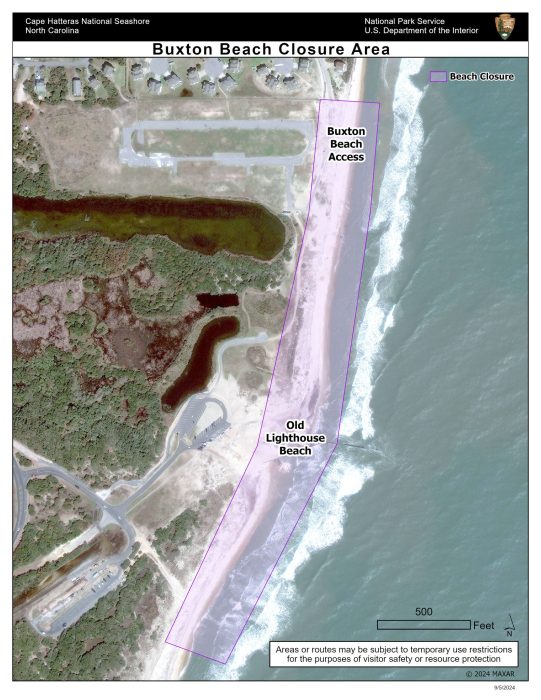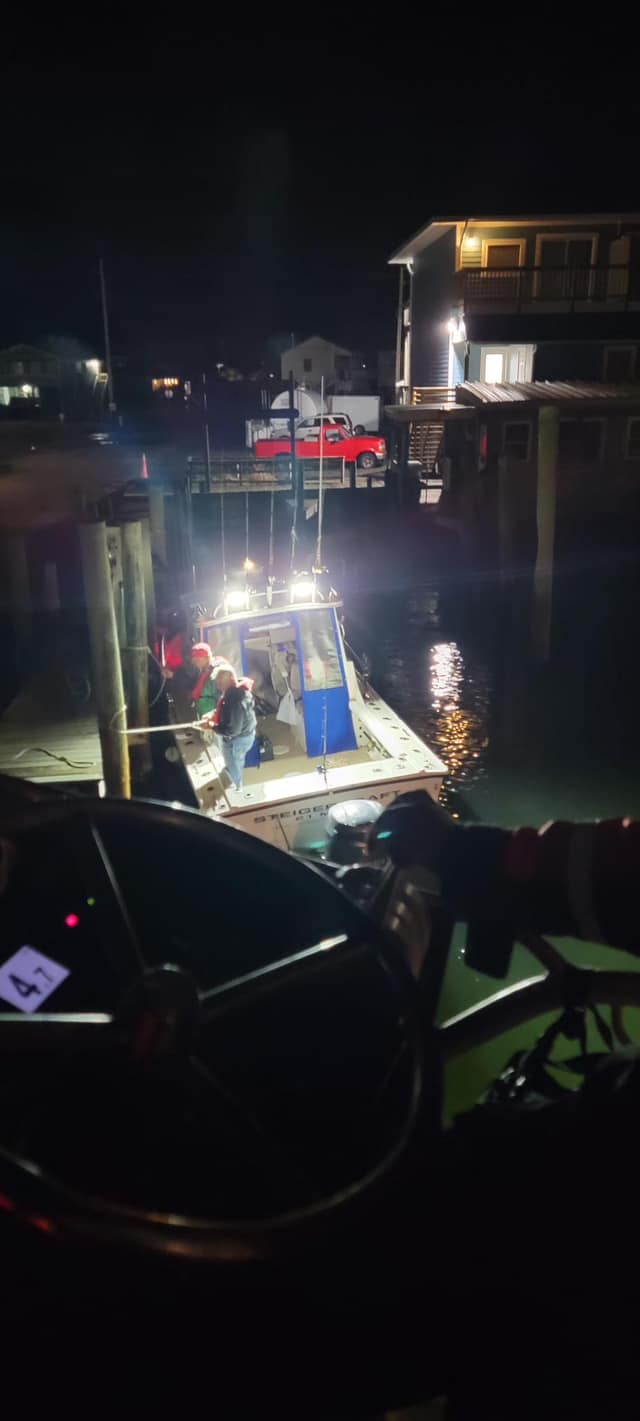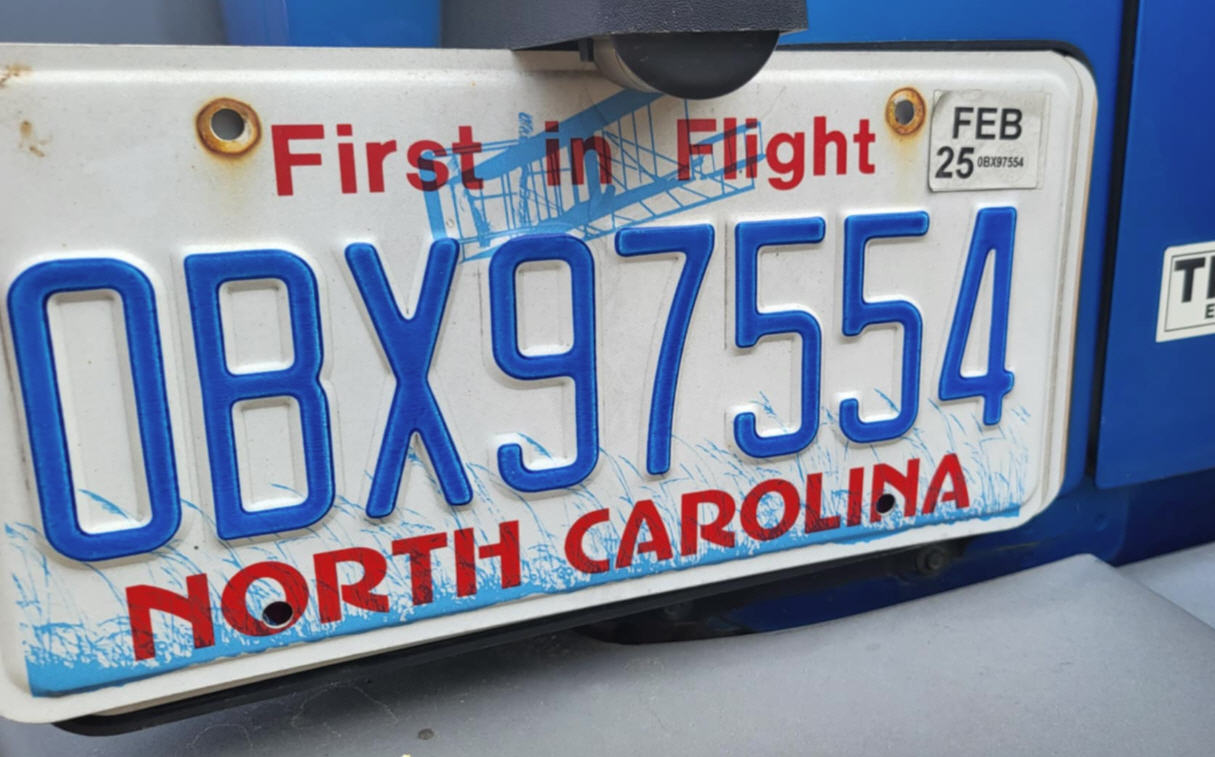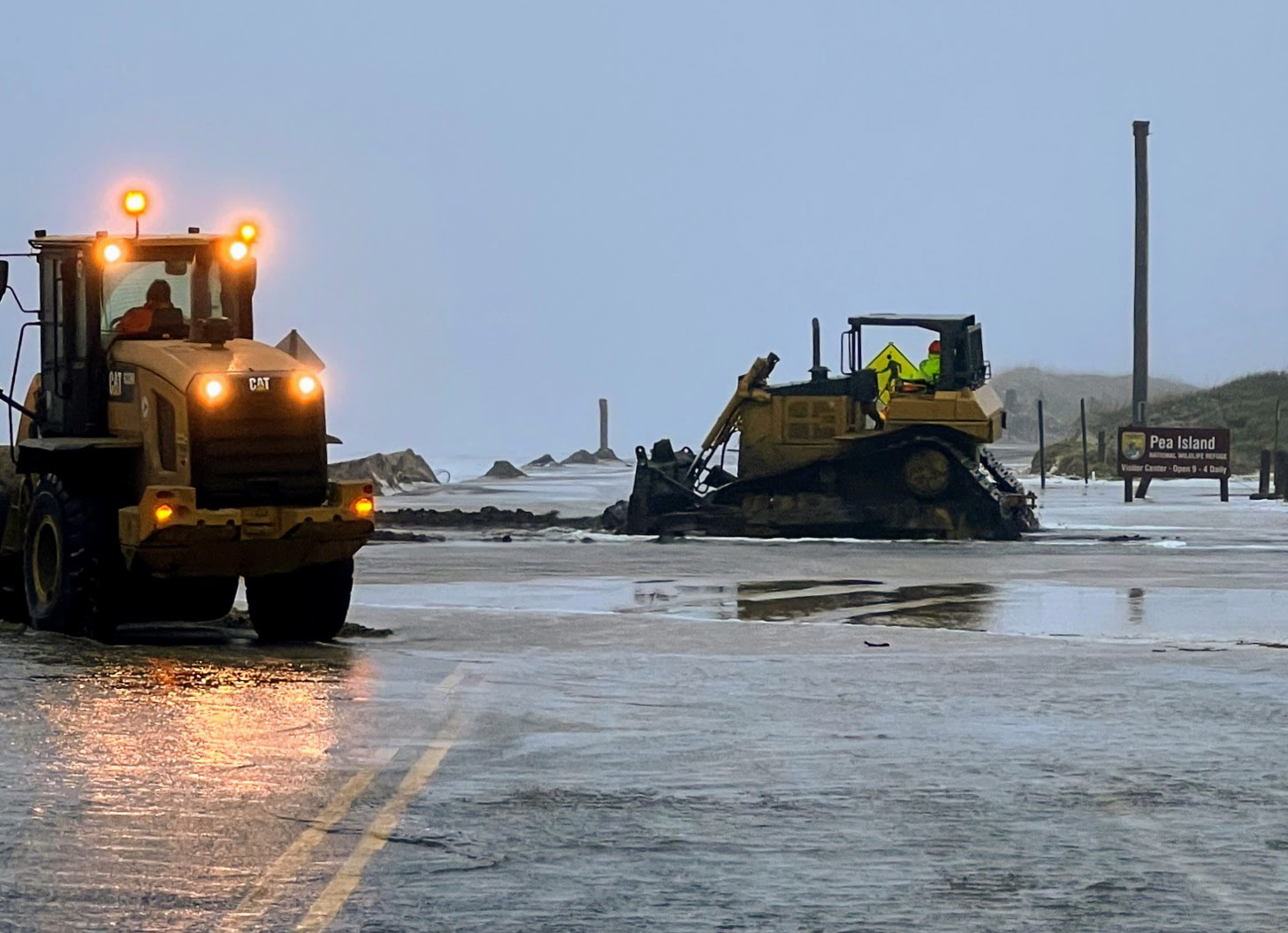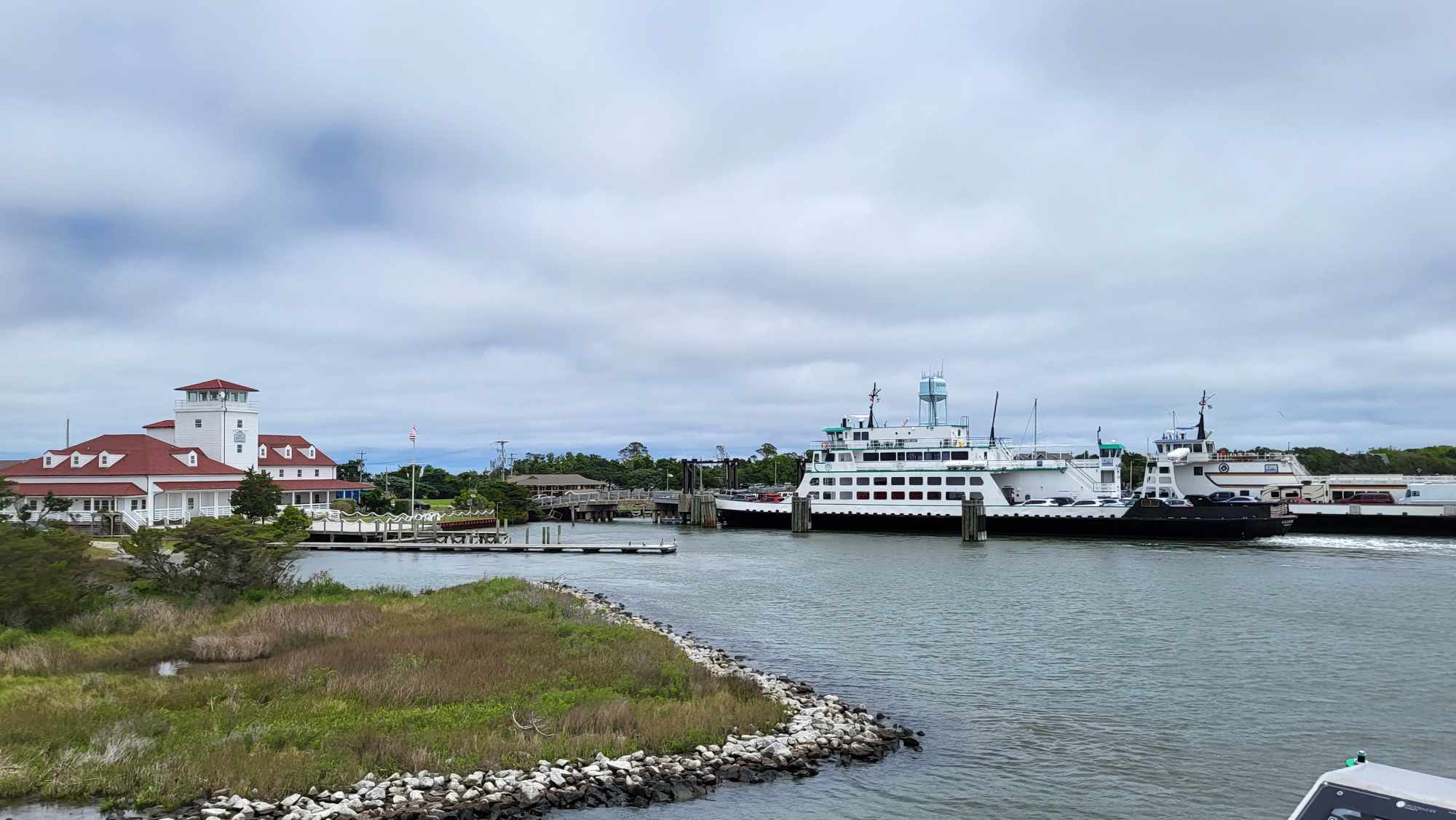First efforts toward petroleum remediation begin at Buxton Beach
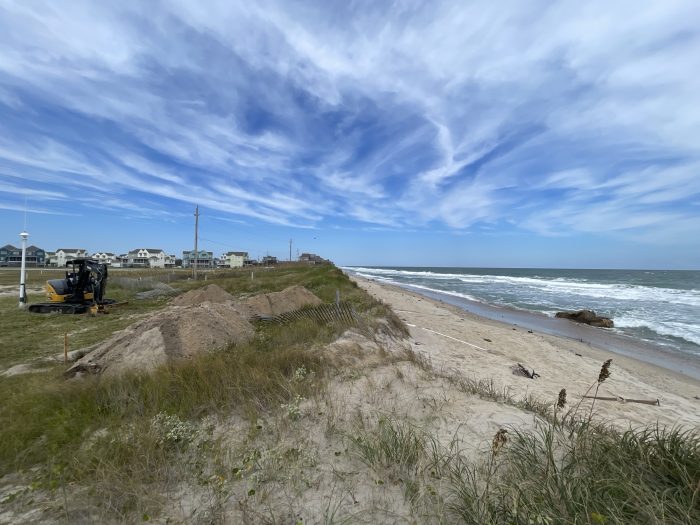
Remediation work for resurfaced petroleum contamination at Buxton Beach is underway, signaling one of the most intensive efforts yet to address the environmental and public safety problems that have plagued the shoreline since September 2023.
The clean-up efforts, spearheaded by the U.S. Army Corps of Engineers (Corps), began to accelerate after an early September 2024 site visit from the Corps, which corresponded with a new wave of resurging petroleum smells and debris on a roughly .5-mile section of shoreline at the end of Old Lighthouse Road.
This stretch of beach has been closed to the public since September 1, 2023, after two offshore hurricanes eroded the shoreline and revealed leftover infrastructure from a 1956-2010 military base, as well as sporadic but strong petroleum smells.
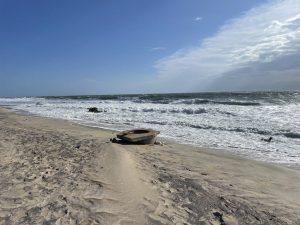
Because the Buxton Beach site is part of the Formerly Used Defense Site (FUDS) program, the Corps is responsible for addressing the petroleum contaminants related to Navy activity from 1956-1982, while the U.S. Coast Guard is responsible for other potential contaminants from their use of the site from 1985-2010. Debate remains on what agency is willing to address non-petroleum debris, such as the concrete foundation and other remains of the Navy’s former Terminal Building.
On Tuesday, September 3, the Corps’ Savannah District Commander, Col. Ron Sturgeon, provided an update at the Dare County Board of Commissioners’ monthly meeting.
At the meeting, the update seemed to reiterate the upcoming actions that were outlined in a summertime press release, which stated that comprehensive testing would begin in October, but no on-site remediation actions were planned until after the October testing was complete, with results expected sometime in 2025.
However, stakeholders attest that a number of corresponding events combined to launch a more immediate and action-oriented response.
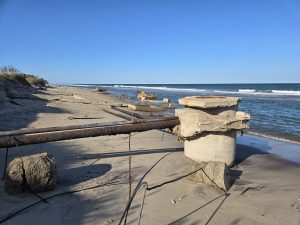
Shortly after the Board of Commissioners’ meeting, Col. Sturgeon and a Corps team visited the Buxton site with National Parks of Eastern North Carolina Superintendent David Hallac. Though the petroleum smell had been strong hours before, at the time of the Corps’ September 3 site visit, it was low tide, and the stench had diminished.
“That evening, around high tide, it got worse,” said Hallac. “We walked the site the next day and we were very concerned at the level of apparent exposure of petroleum contamination.”
By Wednesday, September 4, multiple people in the area had reported very strong fuel smells, coupled with health issues that included red, itchy eyes and nausea. The Cape Hatteras National Seashore, in conjunction with the Dare County Department of Health and Human Services, expanded the closure to include the popular Old Lighthouse Beach Access, and an updated Public Health Advisory from the county was issued.
During this timeframe, Hallac and others were in constant communication with the Corps and the U.S. Coast Guard, letting the agencies know what was happening on the ground in Buxton.
These communications included a conversation with Thomas Woodie, the Deputy District Engineer for Programs and Project Management and Chief of the Planning, Programs, and Project Management Division at the Corps’ Savannah District. In his current role, (which he assumed in May 2024), Woodie oversees the execution and management of an annual program exceeding $1 billion, and leads a team of approximately 70 staff members.
“Tom Woodie drove up the next morning, and saw it firsthand, and he sprang into action right after that,” said Hallac.
“There is now what I would call a three-step plan,” added Hallac. “The Corps is already here and has a team of staff, and a mini excavator is starting to do work behind the dunes.”
“The U.S. Army Corps of Engineers Savannah District in-house team is currently at the site where they are digging west of the dunes in order to potentially locate the source of the petroleum sheen,” confirmed Sara Keisler, FUDS Program Manager for the Corps’ Savannah District, in an email to the Island Free Press.
This current work with minimal equipment is both investigative and indicates the first effort toward petroleum remediation, as chunks of contaminated soil and/or debris are removed.
“If the District team encounters petroleum-impacted soils, the team will remove the impacted soils,” said Keisler. “Additionally, the [Corps] is actively working on a contract that will support a future removal action in areas of the beach and dunes.”
Essentially, the next step for the Corps will be working with a contractor to stop the petroleum contaminants that are infiltrating the oceanfront beach. “This is a significant contract with the Corps, and they will use their expertise to remove contaminated soil and minimize the release of contaminants into the ocean,” said Hallac.
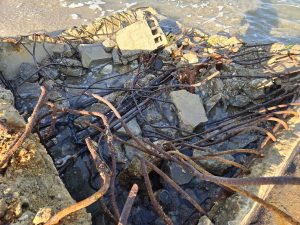
There is no timeframe for how long this process will take, but it could be days, weeks, or even months as the depth of the petroleum issues are uncovered.
The third phase for the Corps is the already-planned comprehensive testing of the entire roughly 50-acre site to identify any additional petroleum contaminants that remain. This phase is still expected to start in October.
“The contract right now is not to fully remediate [the debris] but address the immediate contamination in the area,” said Hallac. “But generally speaking, I feel confident in saying that this will help mitigate the immediate problem of the petroleum being released, and confident that there could be large-scale remediation work.”
As many observers report, there has been noticeably heightened activity at the Buxton site in the last several days.
On Tuesday, September 10, Col. Sturgeon, Woodie, and Keisler visited the Buxton site with a contractor, who was there to develop a detailed plan to remove the petroleum contamination.
On Wednesday, September 11, the Corps’ team began the initial investigative work to identify any clear sources of petroleum using heavy equipment, and on Thursday, the Corps started building a containment site on the property for any contaminated sediment that will be removed in the near future.
Meanwhile, the Corps continues working with a contractor to review and finalize plans for all remedial activities within several areas along the oceanfront, and per multiple reports, the contractor is expected to be fully mobilized within a few weeks.
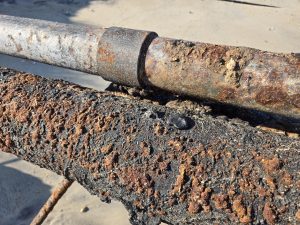
Questions remain about what debris and remnants of old military infrastructure will be removed if they are determined to be related to the petroleum problem. “The FUDS program does not have the authority to remove the infrastructure at the site,” said Keisler. “However, the future interim response action will include excavating soil beneath the remaining infrastructure, which may require removal of some of the infrastructure.”
The Buxton Beach closure remains in place as work continues, due to the fluctuating petroleum smells, accelerating work at the site, and an ever-evolving assortment of debris that remains on the beach.
This past week, exposed cables, wires, foundations, and pipes were further uncovered, with Buxton residents noticing a definite change in how much the issues had progressed in just a few days’ time.
“There’s more being uncovered, and [debris] that was a little buried last week is now completely exposed,” said Buxton Civic Association (BCA) Board Member Wendi Munden. “You just have to go to the beach to see the problem, and to see how much it has changed.”
But BCA Board Members, Buxton residents, and stakeholders like the Cape Hatteras National Seashore are cautiously optimistic that this new wave of activity will lead to some demonstrative results, even if some issues – like leftover foundations and cables – may linger.
“We very much appreciate the quick work of the Corps to implement these activities to protect the environment and the public,” said Hallac. “These are important steps to fully remediate the site.”
“As a community, we welcome the flurry of remedial activity that is occurring and strongly encourage the stakeholders to continue efforts so that we can bring closure at Buxton Beach,” said Dare County Commissioner Danny Couch. “Very incredible to see and experience, firsthand, inspired cooperation between our federal representatives – Representative Murphy and Senators Tillis and Budd – Governor Roy Cooper’s office, and locally with the Commissioners, County Manager Bobby Outten, and the Buxton Civic Association… The commitment is there to see it through to the end. We’re grateful to the Army Corps for attacking the issue.”
